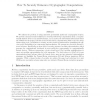Free Online Productivity Tools
i2Speak
i2Symbol
i2OCR
iTex2Img
iWeb2Print
iWeb2Shot
i2Type
iPdf2Split
iPdf2Merge
i2Bopomofo
i2Arabic
i2Style
i2Image
i2PDF
iLatex2Rtf
Sci2ools
135
click to vote
TCC
2005
Springer
2005
Springer
How to Securely Outsource Cryptographic Computations
We address the problem of using untrusted (potentially malicious) cryptographic helpers. We provide a formal security definition for securely outsourcing computations from a computationally limited device to an untrusted helper. In our model, the adversarial environment writes the software for the helper, but then does not have direct communication with it once the device starts relying on it. In addition to security, we also provide a framework for quantifying the efficiency and checkability of an outsourcing implementation. We present two practical outsourcesecure schemes. Specifically, we show how to securely outsource modular exponentiation, which presents the computational bottleneck in most public-key cryptography on computationally limited devices. Without outsourcing, a device would need O(n) modular multiplications to carry out modular exponentiation for n-bit exponents. The load reduces to O(log2 n) for any exponentiation-based scheme where the honest device may use two un...
Related Content
| Added | 28 Jun 2010 |
| Updated | 28 Jun 2010 |
| Type | Conference |
| Year | 2005 |
| Where | TCC |
| Authors | Susan Hohenberger, Anna Lysyanskaya |
Comments (0)

